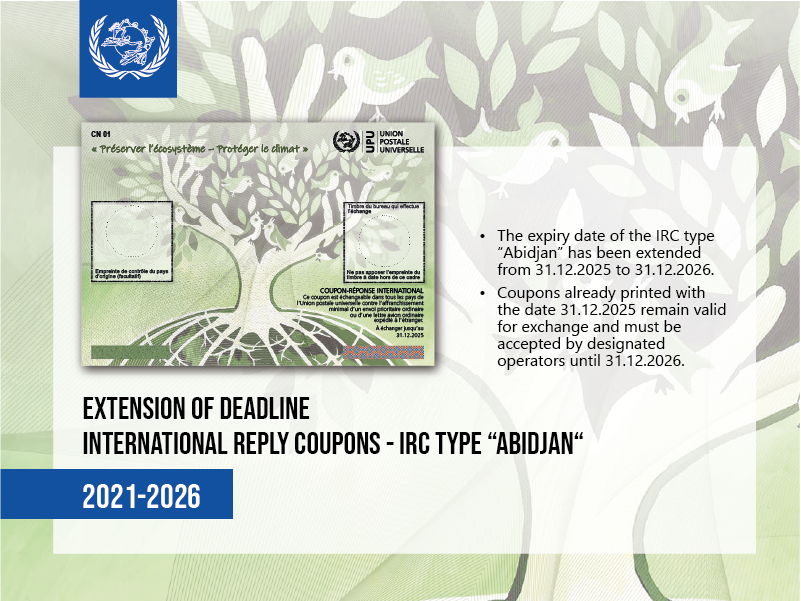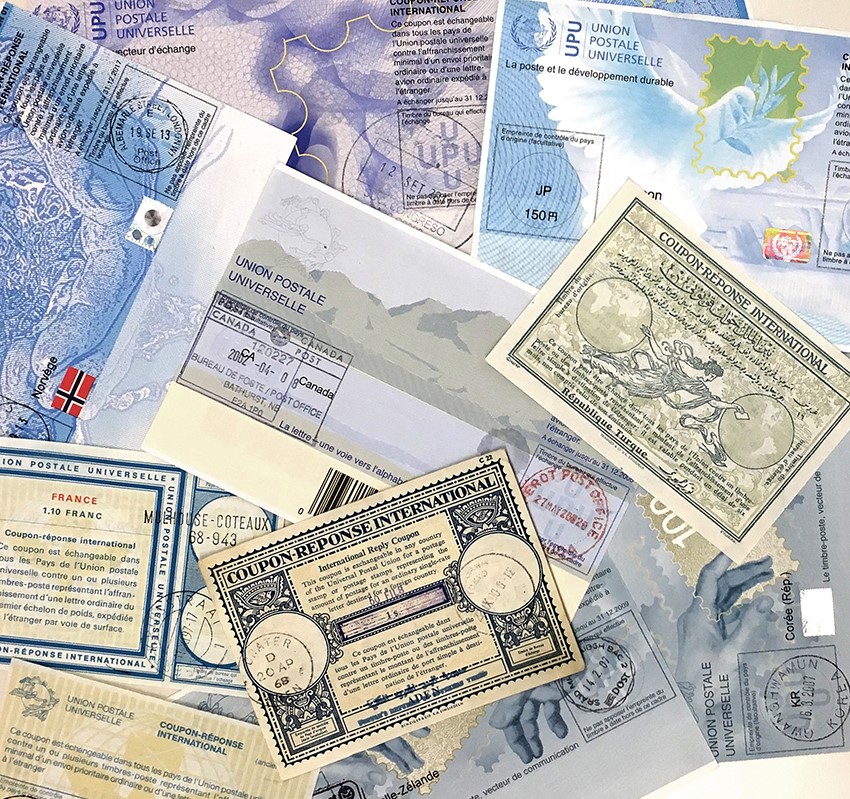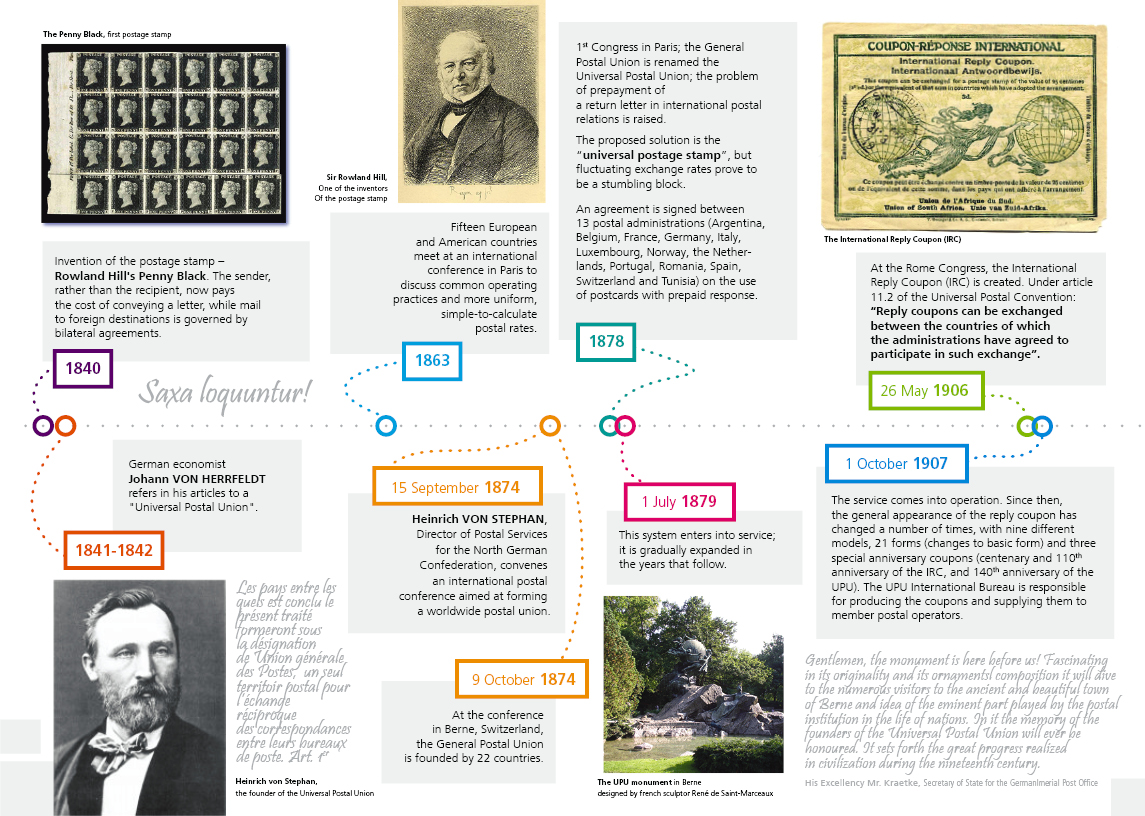News

Since 2001, IRCs have been valid for four years, in line with UPU Congress cycles. Owing to the COVID-19 global pandemic, the 27th Congress, initially scheduled to take place in Abidjan, Côte d’Ivoire, from10 to 28 August 2020 was postponed to 2021 following a decision by an extraordinary session of the UPU Council of Administration.
This postponement had a direct impact on the Abidjan IRC, the expiry date of which had initially been set at 31 December 2025.
The next IRC model is due to be validated at the forthcoming Congress in the second half of 2025. Given that the implementation time frame for a new IRC is six to eight months, the decision was made to revise the expiry date of the Abidjan IRC.
Therefore, Abidjan IRCs already in circulation and bearing the expiry date 31.12.2025 will now be valid for a further year, until 31 December 2026.
All existing Abidjan IRCs will remain valid and exchangeable until this date.
For more information, designated operators can click here.
About
 The international reply coupon (IRC) allows someone sending a letter to another country to pay for the postage for the reply in advance. When the sender writes a letter to a foreign addressee that requires a response, they can purchase an IRC and enclose it with their letter.
The international reply coupon (IRC) allows someone sending a letter to another country to pay for the postage for the reply in advance. When the sender writes a letter to a foreign addressee that requires a response, they can purchase an IRC and enclose it with their letter.
The IRC will entitle the addressee to one or more return postage stamps representing the minimum postage for an unregistered priority item or airmail letter to a foreign country. In short, stamps obtained in exchange for IRCs can be used to reply to the sender.
IRCs cannot be bought directly from the UPU. They are available from local post offices and certain operators. If a national Post does not sell IRCs, customers can buy them from the post office of a neighbouring country.
IRCs can be used for a variety of purposes:
- Requests for information or documents from abroad
- School and university enrolment
- Foreign invitations requiring a reply
History
1840
- The postage stamp is invented
- The first stamp ever issued, "The Penny Black", is created by Rowland HILL
- From this point on, letter postage is paid by the sender
1841/1842
- German economist Johann VON HERRFELDT references a "Universal Postal Union" in his articles
1863
- An international conference is held in Paris, France, bringing together 15 European and American countries to establish common operational models and standardized postage rates that are easier to calculate
15 September 1874
- Heinrich VON STEPHAN, Director of the North German Confederation postal service, organizes the International Postal Conference, with the goal of creating an "International Postal Union"
9 October 1874
- The conference takes place in Berne (SWITZERLAND)
- The "General Postal Union" is founded by 22 countries
1878
- The first Congress takes place in Paris (FRANCE)
- The General Postal Union officially becomes the "Universal Postal Union", and the issue of prepaid reply letters within international postal relations is raised
- The universal postage stamp is the proposed solution, but varying exchange rates pose a problem
- Thirteen postal administrations (AGENTINA, BELGIUM, FRANCE, GERMANY, ITALY, LUXEMBOURG, NETHERLANDS, NORWAY, PORTUGAL, ROMANIA, SPAIN, SWITZERLAND and TUNISIA) arrange to use prepaid reply postal cards
1 July 1879
- This system is put in place and gradually spreads
26 May 1906
- The IRC is created during the Rome Congress
- Article 11.2 of the UPU Rome Convention states, "reply coupons can be exchanged between the countries of which the Administrations have agreed to participate in such an exchange"
1 October 1907
- The service becomes officially available to customers - Since then, the appearance of the IRC has changed several times, with nine different models, 21 different iterations (changes to the basic model) and three special anniversary coupons (for the 100th and 110th anniversaries of the IRC and the 140th anniversary of the UPU)
- The UPU International Bureau is responsible for IRC production and delivery to participating postal operators
More information
Designated operators
General Information - Forms
FAQ
Questions - Answers
Contact
Weltpoststrasse 4
3015 BERNE
SWITZERLAND
